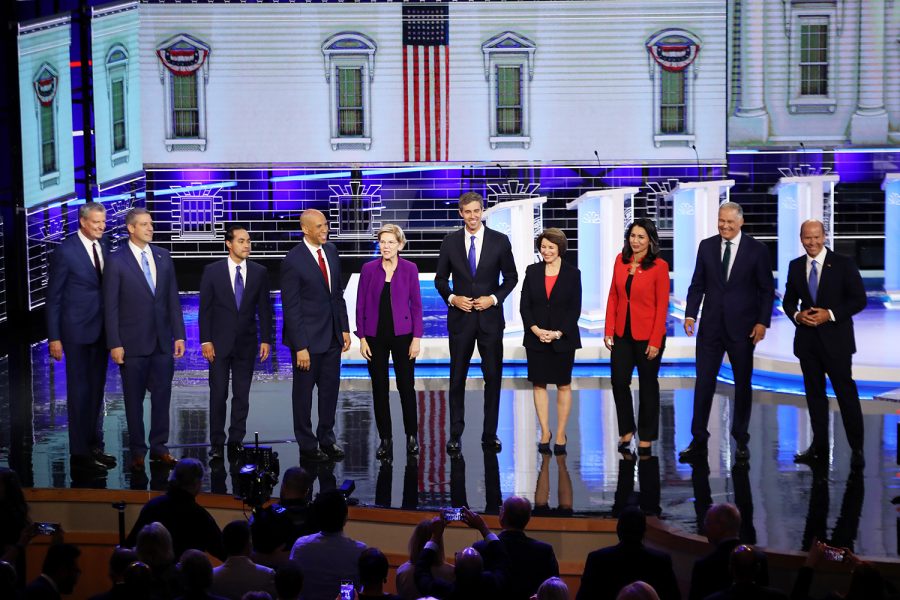Opinion: Democrats’ party infighting is unhelpful to the primary process
Tulsi Gabbard recently attacked Hillary Clinton over tweets in an attempt to remain relevant. This sort of attention-seeking hurts the presidential-nomination race.
From left, Democratic presidential candidates New York City Mayor Bill De Blasio, Rep. Tim Ryan (D-Ohio), former housing secretary Julian Castro, Sen. Cory Booker (D-N.J.), Sen. Elizabeth Warren (D-Mass.), former Texas congressman Beto O'Rourke, Sen. Amy Klobuchar (D-Minn.), Rep. Tulsi Gabbard (D-Hawaii), Washington Gov. Jay Inslee, and former Maryland congressman John Delaney take the stage during the first night of the Democratic presidential debate on Wednesday, June 26, 2019, in Miami. (Joe Raedle/Getty Images/TNS) **FOR USE WITH THIS STORY ONLY**
October 27, 2019
There is a lot of drama between those running for the Democratic presidential nomination. As with any party primary, candidates critique one another over a variety of platforms with unnecessary call-outs and loaded questions. While this is all part of the electoral process and a method for figuring out the best candidate, some go too far. Rep. Tulsi Gabbard, D-Hawaii, most recently exemplified this issue.
Gabbard on Oct. 18 released several tweets attacking former Democratic nominee Hillary Clinton, calling her “mother of warmongers, embodiment of corruption, and personification of rot.” These comments come after Clinton tweeted that Republicans are grooming a Democratic candidate without specifically naming Gabbard.
While attack ads are commonplace in American politics, this is overboard. Instead of going after policy positions or Clinton’s past actions, Gabbard goes far beyond simple name-calling, making Clinton out to be some sort of mustache-twirling villain.
This is not constructive in the slightest. The purpose of these races should be for candidates to challenge one another on policy positions and past records to determine who is most fit for the office of president.
Do we know anything more about Gabbard from this? Have we learned anything about her policies or positions? No.
This Twitter outburst is just a blatant grab for attention from a candidate who is polling below 2 percent, according to RealClearPolitics data.
To follow this Twitter outburst, Gabbard recently announced that she would not seek re-election to Congress in order to focus on the presidential race. Gabbard is clearly pinning all of her hopes on getting as far as she possibly can with this race and seeing what happens afterwards.
It’s not as though this isn’t the norm. Plenty of other Democratic candidates have had their own methods of maintaining relevancy while emphasizing their policy points.
Another presidential candidate who gave up his seat in Congress, Beto O’Rourke of Texas, said “Hell yes, we’re going to take your AR-15, your AK-47.” O’Rourke has strongly championed gun control, making it a point to show that this is what he will fight for, and this approach has garnered him plenty of attention. It is debatable as to whether O’Rourke can accomplish this, but it still fulfills his objective of getting eyes on his campaign.
In the most recent Democratic debates, South Bend, Indiana, Mayor Pete Buttigieg attacked Massachusetts Sen. Elizabeth Warren over her support for Medicare for All, despite the fact that only a few months ago he stated that he supported Medicare for All. This is just one of several of Buttigieg’s attacks against his fellow candidates, staking him out to be the centrist candidate.
Businessman Andrew Yang has made himself stand out by offering 10 randomly selected families a one-year trial of universal basic income. During debates, Yang has also hyped the looming existential threat of automation to an extraordinary extent. But it’s just attention-seeking noise and posturing.
Even author Marianne Williamson is attempting to keep herself present, claiming without evidence that Buttigieg supporters are planning to walk out on one of her events.
At the end of the day, candidates will use every option they have to remain relevant and stay in the race. However, a line in the sand must be drawn to ensure that Democrats do not stoop to such a low level as to resort to unneeded name-calling.
The method of determining a candidate should consider merit, not a candidate’s capacity for tearing down others.
Columns reflect the opinions of the authors and are not necessarily those of the Editorial Board, The Daily Iowan, or other organizations in which the author may be involved.






